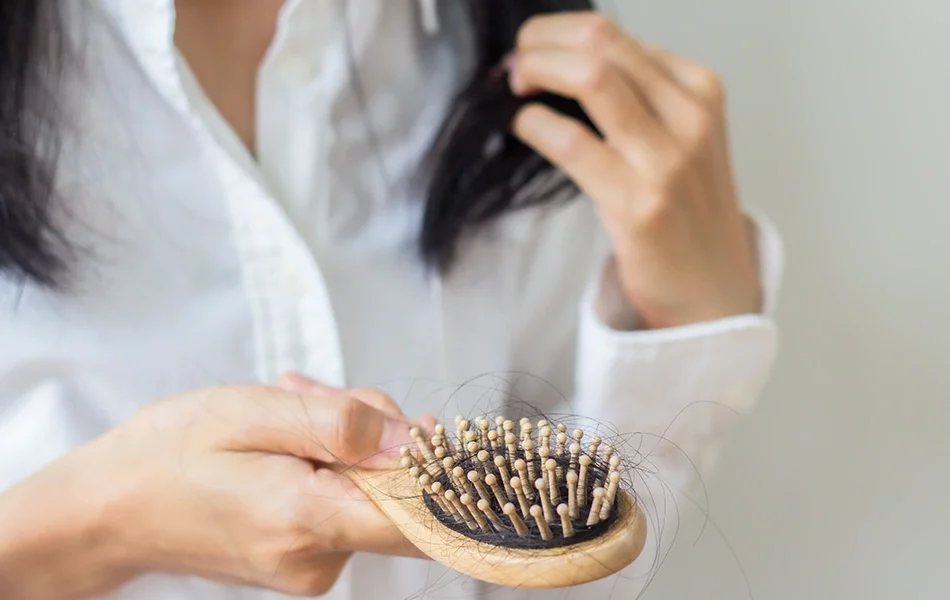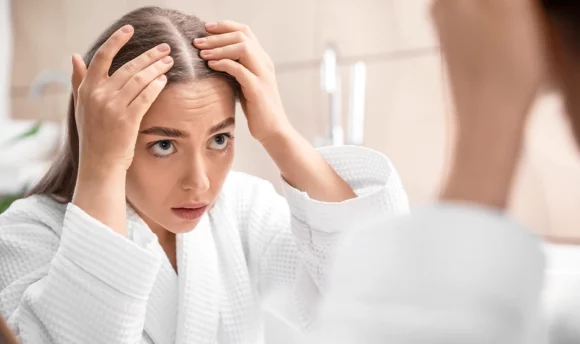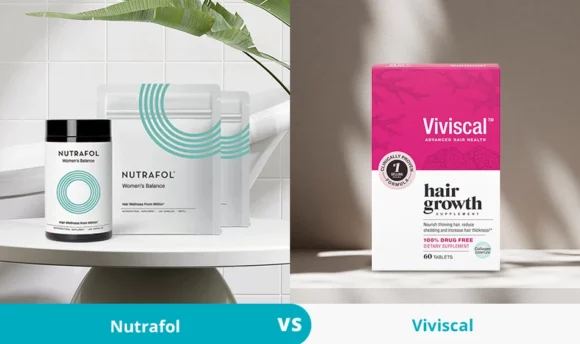Keto Hair Loss: Nutrients, Causes, and Solutions
The ketogenic diet brings numerous health benefits, but like anything, there’s always a downside.

Hair loss can come as a shock to anyone, but you might be more surprised to learn that your diet is the culprit. While the ketogenic diet can bring incredible results for weight loss, energy levels, and metabolic health, it can also bring unwanted repercussions.
As a highly restrictive diet, keto can potentially cause hair loss. The good news is you can ward off hair loss by learning more about how you should approach the low-carb, high-fat diet. A few essential practices will keep your hair in good health as you reap all the other benefits.
Keep reading to learn how to maintain healthy hair throughout your weight loss journey with some conscious steps.
Keto Hair Loss: Why Does It Happen?
Some keto dieters experience hair loss. Nutrient deficiencies are usually to blame as you cut out certain foods from your daily diet. The sudden elimination of carb-containing foods, including many nutritious fruits, vegetables, seeds, nuts, and beans, can leave your body without sufficient micronutrients.
The keto diet is a moderate-protein diet. Sometimes, keto dieters devote all of their attention to consuming fats and cutting down on carbs so that they forget the importance of protein. Too little protein can significantly affect your hair health, resulting in thinning hair and hair loss.
Low-calorie intake is another common culprit. Keto doesn’t tend to set rules for calories, but with a diet rich in satiating fats, you’re likely to end up eating fewer calories than usual. Unfortunately, cutting calories too quickly or drastically can impact normal functions like hair growth.
Last but not least, you must approach the diet sensibly to ensure healthy weight loss at a gradual pace. Sudden, rapid weight loss is a well-known cause of acute telogen effluvium, a form of alopecia characterized by acute hair shedding.
How to Prevent Hair Loss on Keto: 6 Smart Ways
You must follow the keto diet plan carefully to mitigate side effects as much as possible. The six steps below are crucial for keeping your body functioning properly and avoiding problems like hair loss and hampered hair growth. They will also prevent low energy levels and fatigue.
Here’s what you need to do:
#1 Consume more calories
You might unintentionally wind up eating too few calories on keto thanks to filling high-fat foods. Too few calories can also cause nutritional deficiencies that lead to your hair’s health suffering.
Severe calorie restriction isn’t necessary for losing weight on the keto diet because you’re burning fat through ketosis. Therefore, there’s no need to slash too many calories and risk hair loss. Ensure your keto meals have sufficient calories to grow your hair properly.
#2 Get enough protein
The standard keto diet calls for a moderate protein intake, around 20% of total daily calories, to remain in ketosis. While carbs and fats gather the most attention when discussing the ketogenic diet, you shouldn’t forget protein.
Your protein intake is vital for keeping hair strong and healthy. The majority of your hair is made up of protein (keratin), so in order to build keratin, your body needs amino acids from dietary proteins. Without enough protein, the hair strands may become brittle, dry, and weak.
Most animal proteins, such as meat, poultry, and seafood, are keto-friendly. If you are vegetarian or vegan, incorporate tofu into your diet.
#3 Calculate your macros
Tracking your macros is the only way to know if you are consuming the proper nutrients throughout your ketogenic diet. Not only will you see better results, but you’ll also be able to see which macros you lack, helping you recognize possible causes of hair loss.
Keto apps are great tools for keeping track of your keto journey. They provide a designated space to record macros, calories, water intake, and more.
#4 Take care of your gut health
Your gut is responsible for more than you might think. Poor gut health can impact almost every part of your health, including your skin and hair follicles. Moreover, studies show an altered gut microbiota is associated with hair loss, particularly in those with alopecia.
The gut microbiota regulates hormone levels, including those involved in hair growth, like estrogen and melatonin. So, you need to nourish your gastrointestinal system to keep it in good working order. It will also help to alleviate common keto complaints, like constipation.
Some simple gut health hacks will help keep your locks happy, like consuming fiber, getting enough sleep, and drinking water and herbal teas.
#5 Don’t cut carbs drastically
Switching from the typical diet, which is often rich in carbs, to a low-carbohydrate diet is a big change for your body. While you need a drastic carb limit to enter ketosis, immediately dropping below fifty grams a day can overwhelm you and interrupt your body’s functions.
So, it’s better to ease into the lifestyle gradually. Remember, you don’t need to eliminate entire food groups with the keto diet. Low-carb diets still allow some carbs (up to 50g a day), so don’t try to cut them out entirely.
#6 Transition to ketosis slowly
Most people enter ketosis within a few days of following the keto diet, although you can enter within 24 hours. Many try to rush into ketosis to induce rapid weight loss. However, your body needs time to transition to the changes, and suddenly entering ketosis can shock the system.
You can ease into ketosis by cutting down on your carb intake gradually.
What Nutrients to Take on Keto for Healthy Hair?
Your hair needs essential vitamins and minerals to maintain optimal health. Nutrition is extremely important for a healthy hair growth cycle and for minimizing hair fall and thinning. Some nutrients are more necessary than others when it comes to your hair, and these include:
#1 Biotin
Biotin is one of several nutrients needed for keratin production – the protein that makes up most of your hair and ensures healthy hair growth while keeping your skin and nails strong. One study found that 38% of women complaining of hair loss had a biotin deficiency.
Most people can get enough biotin from eating a balanced diet. Fortunately, biotin is present in many keto-friendly foods, such as egg yolks, avocados, salmon, nuts, and cauliflower. You should eat these foods regularly to get your biotin and a good amount of healthy fats.
#2 Collagen
Collagen also boosts keratin production as it is rich in protein-building amino acids. It supports scalp health and the healthy structure of the hair follicles. These components are necessary to create a healthy environment for your hair to grow while mitigating the risk of hair loss.
Fish-derived collagen peptides, in particular, have been shown to enhance hair regrowth. Like biotin, you can get collagen from your keto diet by eating skin-on fish like salmon and sardines, bone broth, beef, pork, and poultry.
#3 Zinc
Zinc is an essential trace element, meaning your body cannot make it on its own – it has to come from your diet. Alopecia, a disease that causes hair loss, is a common sign of zinc deficiency. Studies show that zinc supplementation can encourage hair regrowth.
Red meat is an excellent source of zinc, including beef, lamb, and pork.
#4 Selenium
Selenium is important for a healthy scalp because it helps treat dermatologic conditions like dandruff and seborrheic dermatitis. These conditions irritate the scalp, and the subsequent scratching may damage the hair follicles. This can hamper hair growth and even lead to hair loss.
Brazil nuts, mushrooms, and sardines are good keto-friendly sources of selenium.
How Long Does Hair Loss Last on Keto?
Hair loss on the keto diet is usually temporary, although it does depend on the exact cause. If you improve your nutrition and correct any nutrient deficiencies, your hair should begin to return to good health, making way for new hair growth within a few months.
Alongside revamping your diet and refreshing your approach, a haircare regimen is a must. Scalp massages, essential oils, and investing in hair cosmetics like a gentle shampoo and nourishing conditioner are all tricks to drive hair growth and encourage healthier, thicker hair.
FAQs
Hair loss as a result of the ketogenic diet is usually temporary. However, it can be permanent, depending on the precise cause. Talk to your doctor if you are worried about regrowing your hair, as they can guide you toward the best course of action.
The keto diet is not likely to stimulate hair growth. In fact, restrictive keto diets lacking in nutrients can contribute to slow hair growth and hair loss. Maintaining a nutritious diet rich in vitamins and minerals is critical for keeping a healthy head of hair.
Cutting carbs means cutting out many nutritious foods from your diet, including high-carb fruits and vegetables. You may develop a nutrient deficiency if you miss out on too many essentials in your daily diet, and this could initiate hair loss.
A Word From an MD
The human body needs key vitamins and minerals to keep everything running, including your hair growth cycle. A lack of protein, micronutrients, and calories can all impact hair growth and contribute to premature hair loss.
You must take special care with your keto diet to ensure you don’t unintentionally put your health at risk. It can help to educate yourself thoroughly before you start so you know exactly what your body needs to thrive. It can help to plan your meals and take supplements where necessary.
If you continue losing hair despite your efforts, you should seek professional medical advice, as there could be another reason behind your hair loss. A discussion should also be had with your doctor before starting the diet, as keto is not a safe pick for everyone.
Conclusion
The shift to a high-fat, low-carb diet with a potential loss of nutrients can wreak havoc on your hair. It’s hard to maintain a thick mane without adequate nutrition. Still, you can lower the risk of hair loss by prioritizing the essential vitamins and minerals while transitioning to ketosis slowly.

















































 Select your language:
Select your language: 








